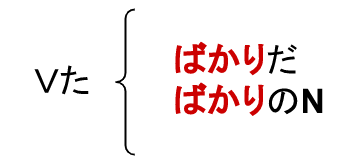~たばかり (have just done)
- Other meanings: just finished; something just occurred
- Can be used to convey something just ended, something just started, etc.
- The important thing to remember is that this structure conveys that not much time has passed since action V was done.
Conjugation
You only use the past tense of the verb, as the action has already happened.
- When using ばかりのN, you are describing a situation or place or other noun where you just began doing ~.
- For example: 日本語を習い始めたばかりの頃 means “the time when I just began learning Japanese.”
- If you got rid of the の頃, the meaning would change to “I just began learning Japanese.”
Examples
日本語を習い始めたばかりの頃は、簡単なあいさつさえできなかった。
When I first started learning Japanese, I couldn’t even do a simple greeting.
今、始まったばかりです。
It just started now.
\n \n \n \n
